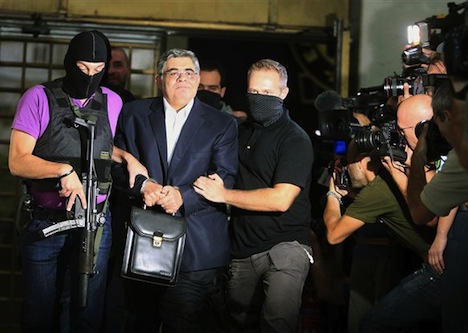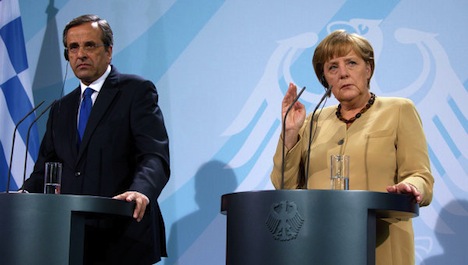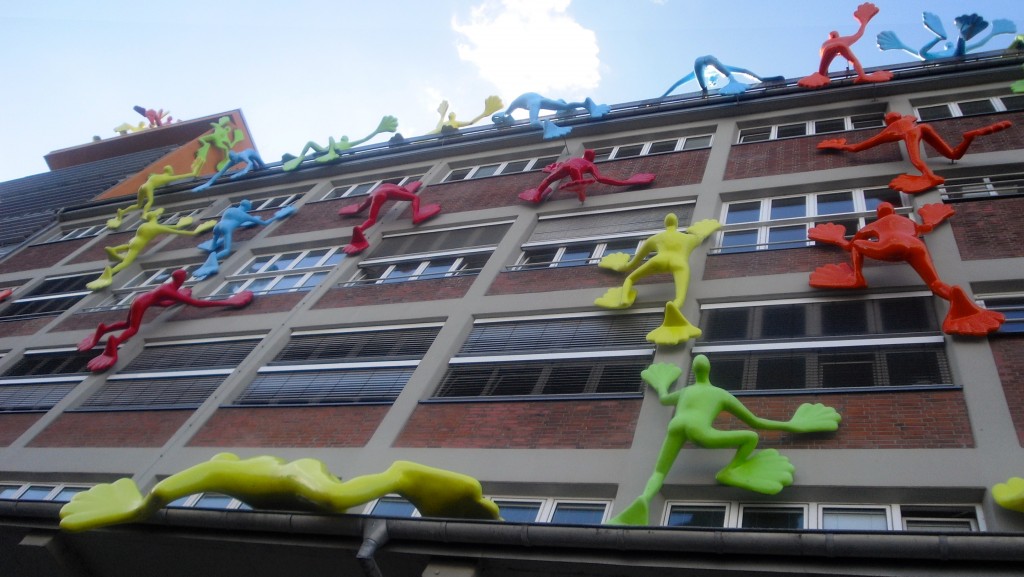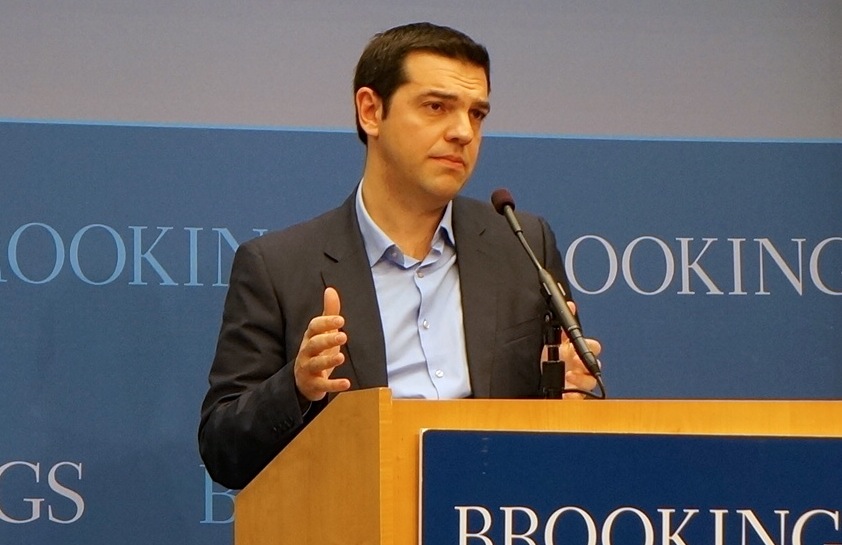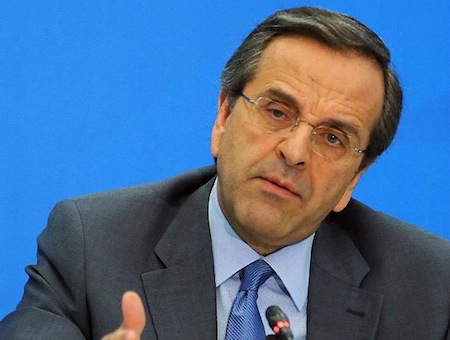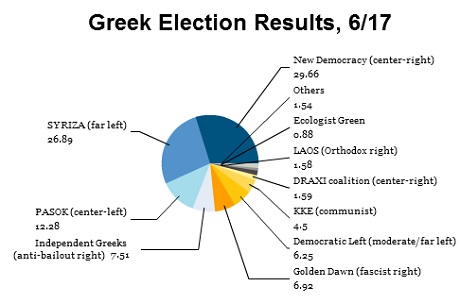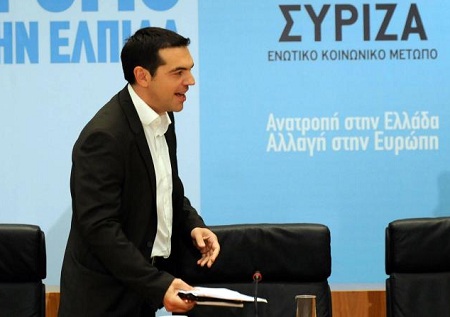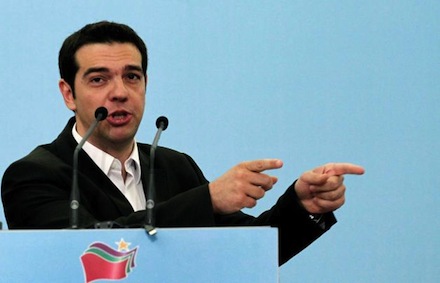Over the course of the past week, the Greek government stepped up its efforts to treat Greece’s hard-right, neo-fascist party, Golden Dawn (Χρυσή Αυγή) with the kind of speed and clarity that one rarely sees in Athens.![]()
Those efforts follow the stabbing of anti-fascist hip-hop artist Pavlos Fyssas over a week ago, which marked a turning point for the coalition government that center-right prime minister Antonis Samaras leads. Greek authorities over the weekend arrested Golden Dawn’s leader Nikos Michaloliakos (pictured above) and other party members, including party spokesman Ilias Kassidiairis, on charges of belonging to a criminal organization. It was an unprecedented action in Greece’s post-dictatorship democracy — the first time since 1974 that MPs, let alone a party head, were arrested.
But things took an awkward turn on Wednesday when three of the Golden Dawn MPs (but not Michaloliakos) arrested were released pending trial, adding to doubts that Samaras’s government is making the right choice in suddenly treating Golden Dawn as more of a criminal organization than a political organization, however vile its organizing beliefs. Kassidiaris (more on him here) did himself no favors by kicking and pushing members of the media upon his release Wednesday.
Support was already crashing for Golden Dawn in the wake of the murder — the party dropped from winning around 13% support in polls to just around 6% or 7% last week in the aftermath of the Fyssas murder. In real terms, that means that Golden Dawn would no longer be the third-largest party if elections were held in Greece tomorrow. After winning 6.92% in the previous June 2012 elections, Golden Dawn currently holds 18 seats in the 300-seat Hellenic Parliament (Βουλή των Ελλήνων), and the party had been threatening to resign en masse, leading to distracting by-elections. Golden Dawn, which began as a ‘nationalist socialist’ magazine in 1980, comprised mostly of misfit supporters of the right-wing military junta that ruled Greece between 1967 and 1974, was a very minor presence in Greek political life before — until Greece’s economy plunged into contraction, unemployment, misery and social discord over the past four years. (Read more background on the group’s history here.)
If you want to understand why Golden Dawn’s popularity has ballooned, check out the trajectory of the Greek economy from growth to severe depression over the past seven years:
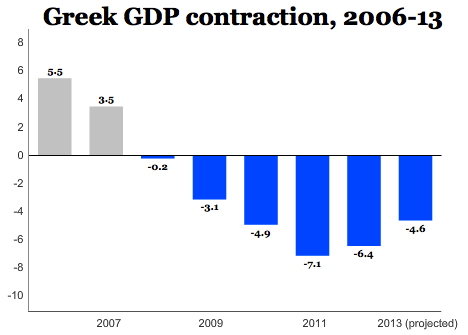 Golden Dawn was already growing into something more than a political party — a mutual aid society to provide food and other necessities (but only, of course, to ‘pure’ Greeks) and a near-paramilitary outfit that drew, according to some Greek analysts, the support of 50% of the Greek police forces.
Golden Dawn was already growing into something more than a political party — a mutual aid society to provide food and other necessities (but only, of course, to ‘pure’ Greeks) and a near-paramilitary outfit that drew, according to some Greek analysts, the support of 50% of the Greek police forces.
But Golden Dawn’s polling collapse was, even before the crackdown, good news for Samaras — right-wing voters who had flirted with Golden Dawn seemed to be returning to Samaras’s more conventional conservative New Democracy (Νέα Δημοκρατία), which has boosted it once again over the anti-austerity, leftist SYRIZA (the Coalition of the Radical Left — Συνασπισμός Ριζοσπαστικής Αριστεράς). Before the latest drama in Greece, SYRIZA had eclipsed New Democracy in many polls, even as Greece faces the humiliating prospect of requesting a third bailout from the ‘troika’ of the European Central Bank, the European Commission and the International Monetary Fund.
So why would Samaras make this push now? His sudden aggressive tack against Golden Dawn comes with the risk that Samaras will transform Michaloliakos and his party into martyrs, thereby boosting their support when they might have otherwise faded away as Greeks backed away from a group with such openly neo-Nazi leanings. Continue reading Cracking down on Golden Dawn’s leadership is a risky strategy for the Greek government
